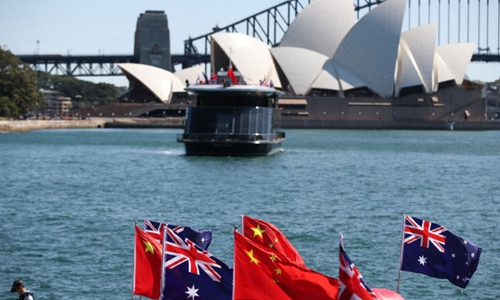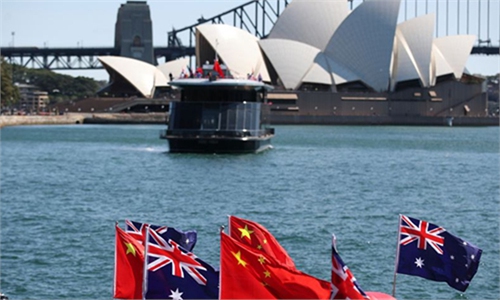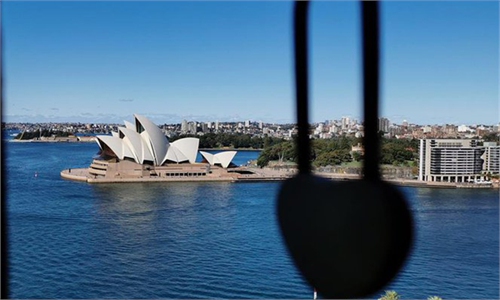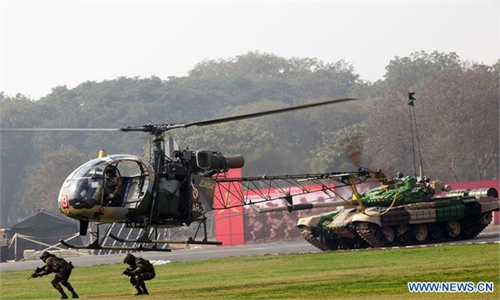
Chinese and Australian national flags are seen at an event in Sydney, Australia. File photo: Xinhua
Australian Senator Rex Patrick of the Centre Alliance party wants at least 100 Chinese diplomats and consular employees expelled from Australia. He claims there is "no question" that Chinese embassy and consular staff are involved in spying and political interference, according to Australian newspaper The Canberra Times. Patrick also reportedly said Canberra must reset its ties with Beijing and adopt a much firmer footing.
Patrick's rhetoric embodies a kind of toxic political atmosphere in Australia. Hysterical McCarthyism is now prevailing in Australia.
Patrick, a senator for South Australia, seems to lack fundamental knowledge on diplomacy, international relations, China, and China-Australia relations. Expelling diplomats means a breakdown of goodwill between the two countries. He is short of basic information on China, all of which may come from the prejudice of media reports - probably sensational TV news. Making such rhetoric against China may merely be his attempts to win more right-ring supporters in his electoral district - at the cost of impairing China-Australia relations.
Australia is responsible for the deterioration of its ties with China. Recently, Australian politicians have groundlessly blamed China on a wide range of affairs, including the national security law for Hong Kong. Australia is clearly aware of the significance of the Chinese market to its development. To ease its ties with China, Australia politicians should show a positive stance. Judged from their current rhetoric and moves, they have still continued to provoke China, with no sign showing their reflection.
Australia has provided no evidence that China's diplomats and consular employees are spying. Yet as a member of the Five Eyes alliance, Australia has engaged in espionage missions with the other four countries, some of which have been publicly reported. Patrick's words sound like an ironic trick of a burglar who cries out, "stop thief."
The intelligence network of the Five Eyes alliance has spread across the world. The alliance's espionage and infiltration activities are de facto common knowledge in all countries. There have been infamous incidents related to the five countries - such as what had been revealed by Snowden and Assange. Both showed how the Five Eyes engage in cyber-spying.
Australia's intelligence and security departments have a long history of gathering sensitive data about China. In 1995, the ABC and the Sydney Morning Herald exposed that the Australian Secret Intelligence Service, along with the help of 30 US National Security Agency technicians, bugged the then newly constructed Chinese Embassy in Canberra in the late 1980s. The elaborate system of fiber optic bugging devices, which were the most advanced at that time, had been covertly installed throughout the embassy during its construction in the late 1980s. China had to build a new embassy in Australia after this highly sophisticated espionage operation.
A Chinese idiom translated into English says, "the bad guy is the first to sling accusations." Australia has acted this way. It also mistakes China for a country that conducts espionage as it does.
The Australian government is not likely to act as Patrick proposes. Australia is in need of China, which has a vast market that is vital to Aussie economic development. Australia is aware of China's importance to Australia, and will not ruin its future.
Nonetheless, Australian diplomacy is dependent on the US. So Canberra is likely to follow suit no matter what Washington does. The current state of China-Australia ties is, to a great extent, the result of Aussie leadership's cozying up to the US' anti-China campaign. Canberra lacks backbone in its diplomacy. Since the US regards China as an important strategic rival and spares no efforts to suppress the latter, Australia has adjusted its policies accordingly. But Australia has its own interests, which are different from those of the US. It should maintain its diplomatic independence.
China-Australia ties are at a crucial stage. The normal development of bilateral relations needs the guidance of politicians, who should voice support to ease tensions. However, remarks like Patrick's will only further poison the two countries' relationship. This will probably result in a downhill trend - which will be hard to reverse.
The article was compiled by Global Times reporter Lu Yuanzhi based on an interview with Liu Qing, director of the department for Asia-Pacific security and cooperation at the China Institute of International Studies. luyuanzhi@globaltimes.com.cn



